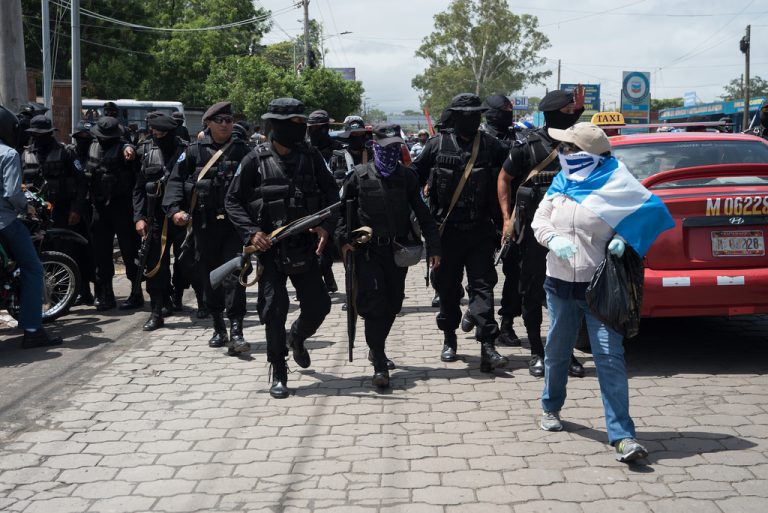
Children of Exile: The Births “Sowing Hope” in the Camp of Nicaraguan Farmers

PUBLICIDAD 1M
PUBLICIDAD 4D
PUBLICIDAD 5D
The illegal prohibition of the right to civic protest demonstrates Ortega’s final failure: he cannot govern, nor negotiate, without resorting to force

September demanding the release of the political prisoners. Photo: Carlos Herrera / Confidencial
Last Thursday, under the protest of the student movement, the Civic Alliance rejoined negotiations with the Ortega dictatorship, with the Vatican’s representative as a witness, when the Organization of American States conditioned its participation as international guarantor of the Dialogue under the condition of the release of all the political prisoners.
Following the mandate of the Secretary General of the OAS, Luis Almagro, his special envoy in Managua, Luis Angel Rosadilla, demanded that the regime release all political prisoners and present a timetable for their release, which would be negotiated with the Alliance on Friday. [Something that did not occur.]
“We agree with a process of dialogue, not exactly as mediators, but as guarantors of that process,” Almagro said weeks ago. He added: “We have requested the release of all political prisoners because we cannot enter into a negotiation in which we have to negotiate liberties.”
However, on Friday the dictatorship aggravated the national crisis by releasing only fifty political prisoners, whom were granted house arrest, while the National Police unleashed a new wave of repression by banning a civic march called for Saturday by the Blue and White National Unity coalition.
The failure of Ortega to comply has caused a new stalemate in the negotiations and fuels the national demand for the release of all prisoners, who are actually political hostages of the regime. Meanwhile, the imposition of a de facto state of siege to prevent the people from demonstrating, is proving that the political time of Ortega and Murillo has reached its final stage.
What the blue and white national movement is demanding, now with the full support of the international community, is the cessation of repression and political persecution, and the annulment of all political trials, so that not a single hostage remains in hands of the dictatorship.
The release of 162 political prisoners – 50 on Friday and another 112 on February 27 – represents a resounding political and moral victory for the protest movement. Inside and outside the prison, they symbolize national dignity, the greatest example of resistance against the dictatorship, and the defeat of the government’s narrative of a “coup d’état” that is already causing a growing confusion, even among the fanatical supporters of the regime. But none are totally free, as they are under house arrest, and there are more than 500 political prisoners still in prisons.
The recovery of freedom consists in fully exercising the rights of assembly, mobilization, and freedom of expression, so that people can demonstrate and promote their demands in the Dialogue, without being repressed or harassed by the Police and the paramilitaries.
The National Police does not have any legal authority to prohibit and repress a civic march, such as the one convened for Saturday by the Blue and White National Unity coalition. This unconstitutional prohibition and the imposition of a militarized state through the police, evidence the collapse of a regime that cannot maintain a single day in power, without resorting to the use of force and repression. Ortega and Murillo do not have the political will to restore public liberties, because they can only exercise power as dictators.
There is no middle ground between the right to freedom and the de facto state of siege. The police who resist applying repression, and the FSLN supporters who propose to vindicate the role of Sandinismo in a democratic society, do not like the dictatorship either. On the other hand, for Ortega and Murillo, restoring the right of people to protest in the streets and expressing themselves in full freedom, would be tantamount to recognizing the failure and unviability of their model of dictatorial government.
Consequently, the only possibility that this negotiation between the Civic Alliance and the Government and the Sandinista Front party can be resumed with any possibility of success, is through the separation from power of Daniel Ortega and Rosario Murillo, to facilitate a political and constitutional solution.
Given the reluctance of Ortega and Murillo to resign, as would correspond to a statesman with some degree of commitment to the national interest, it is imperative to exercise maximum national civic pressure and international diplomatic pressure.
With citizens in the streets; with the economic pressure of the big business people, who can still play a role in restoring democracy; and with the condemnation of the international community, which shouldn’t sit and “wait and see” the outcome of the dialogue without exerting maximum pressure now.
The outcome of the negotiations depends on the simultaneous pressure on the street, from business people, and diplomacy, added to the social unrest caused by the aggravation of the economic crisis and the reluctance of the regime’s forces to continue repressing. The deadlines, therefore, are political, and cannot be pre-scheduled for March 28, as the negotiators proclaim, nor for April 3, as suggested by the United States Government.
The crisis caused by the very serious violations of human rights is inseparable from the crisis stemming from the lack of democracy and electoral fraud. Therefore, the whole point of the negotiation will be the political reforms to convene early elections, without Ortega and without Murillo, and the investigation by a Special Prosecutor, of all the crimes of repression, to lay the foundations of justice without impunity. The Nicaraguan Army must also assume its institutional responsibility and disarm the paramilitary gangs, which must be the subject of an investigation so that they may be brought to justice.
That is the only negotiation that can restore peace to the country, and establish a path of sustainable economic recovery, with justice and democracy.
Archivado como:
PUBLICIDAD 3M
PUBLICIDAD 3D